Business Law and Ethics PDF
VerifiedAdded on 2021/06/15
|10
|2607
|22
AI Summary
Contribute Materials
Your contribution can guide someone’s learning journey. Share your
documents today.
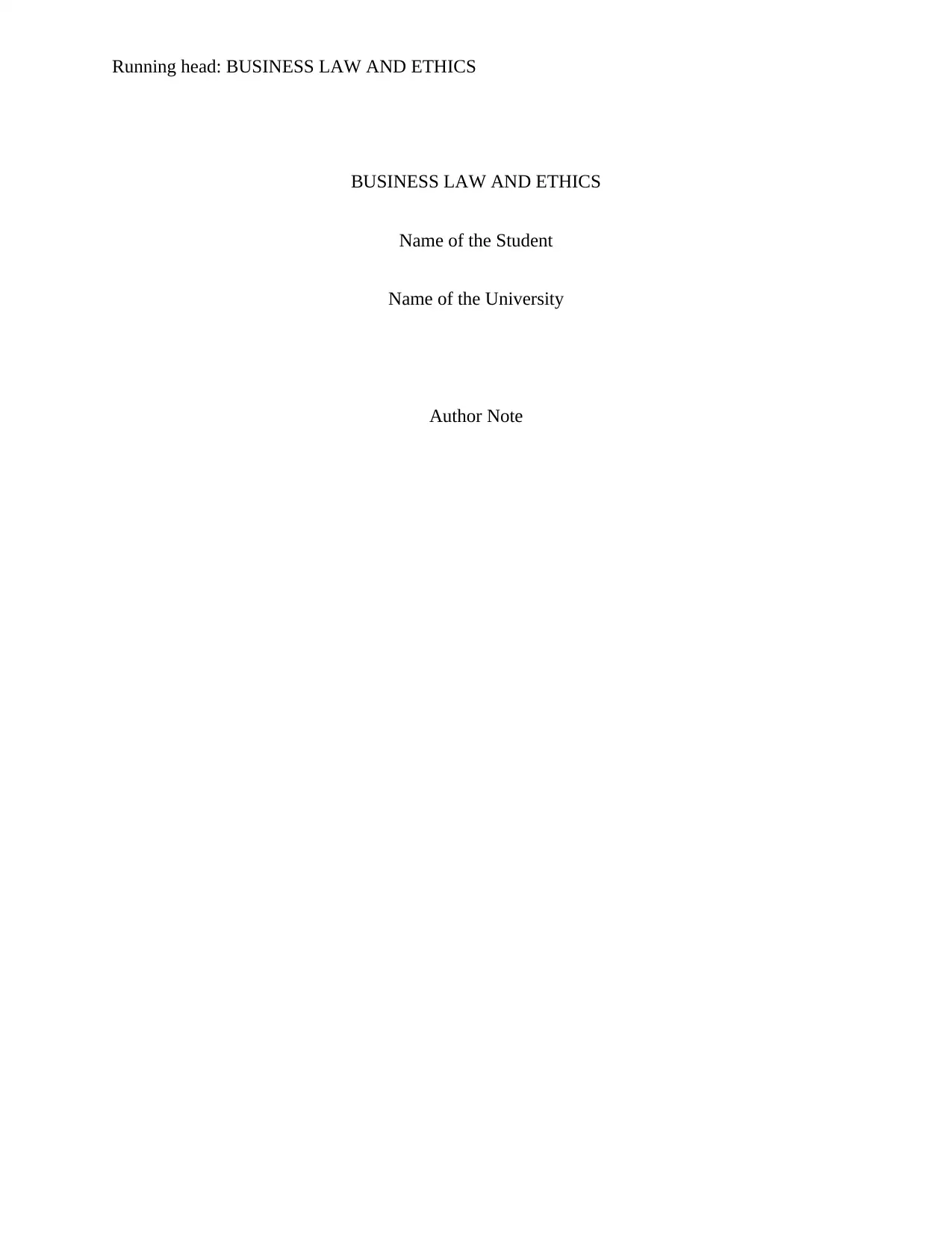
Running head: BUSINESS LAW AND ETHICS
BUSINESS LAW AND ETHICS
Name of the Student
Name of the University
Author Note
BUSINESS LAW AND ETHICS
Name of the Student
Name of the University
Author Note
Secure Best Marks with AI Grader
Need help grading? Try our AI Grader for instant feedback on your assignments.
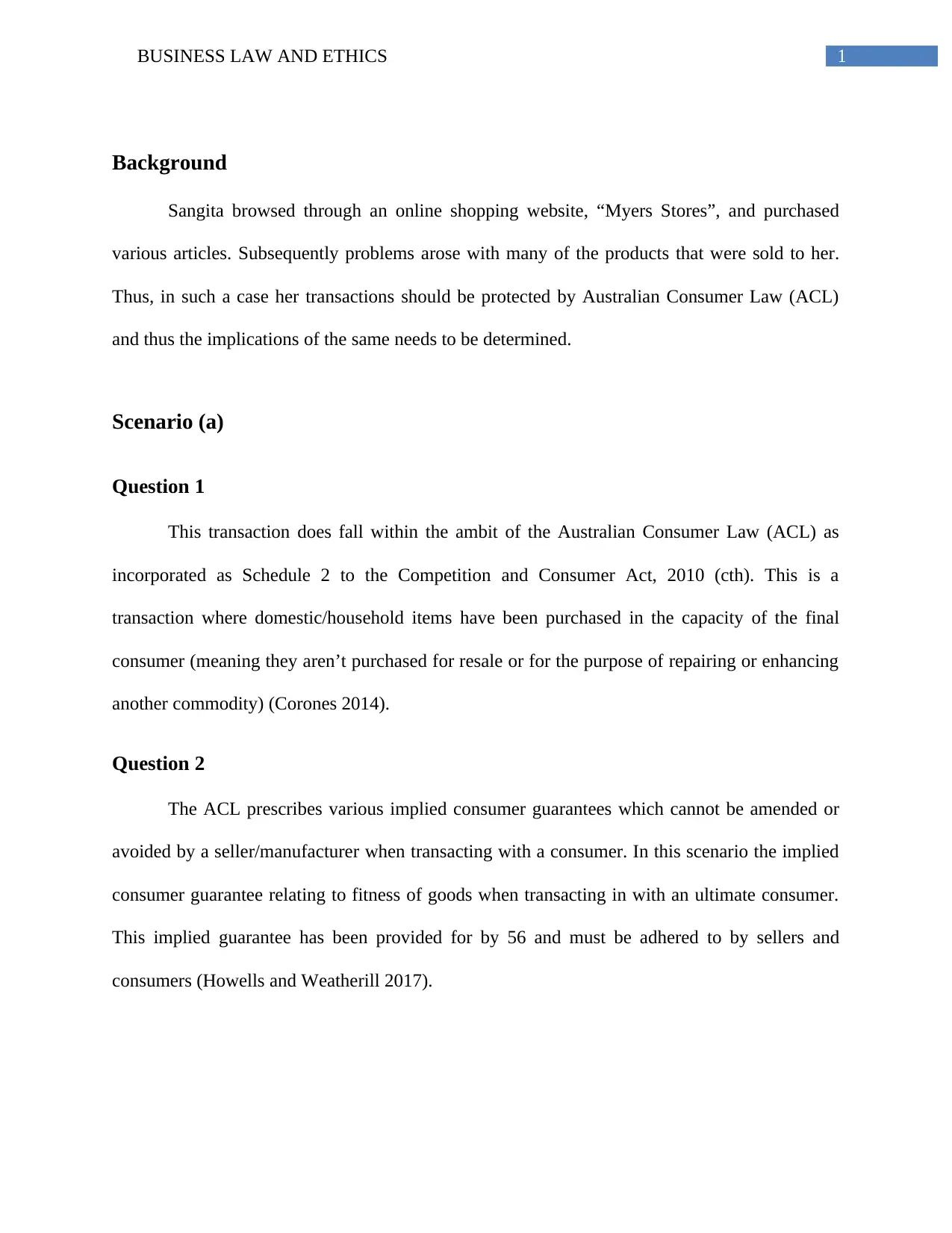
1BUSINESS LAW AND ETHICS
Background
Sangita browsed through an online shopping website, “Myers Stores”, and purchased
various articles. Subsequently problems arose with many of the products that were sold to her.
Thus, in such a case her transactions should be protected by Australian Consumer Law (ACL)
and thus the implications of the same needs to be determined.
Scenario (a)
Question 1
This transaction does fall within the ambit of the Australian Consumer Law (ACL) as
incorporated as Schedule 2 to the Competition and Consumer Act, 2010 (cth). This is a
transaction where domestic/household items have been purchased in the capacity of the final
consumer (meaning they aren’t purchased for resale or for the purpose of repairing or enhancing
another commodity) (Corones 2014).
Question 2
The ACL prescribes various implied consumer guarantees which cannot be amended or
avoided by a seller/manufacturer when transacting with a consumer. In this scenario the implied
consumer guarantee relating to fitness of goods when transacting in with an ultimate consumer.
This implied guarantee has been provided for by 56 and must be adhered to by sellers and
consumers (Howells and Weatherill 2017).
Background
Sangita browsed through an online shopping website, “Myers Stores”, and purchased
various articles. Subsequently problems arose with many of the products that were sold to her.
Thus, in such a case her transactions should be protected by Australian Consumer Law (ACL)
and thus the implications of the same needs to be determined.
Scenario (a)
Question 1
This transaction does fall within the ambit of the Australian Consumer Law (ACL) as
incorporated as Schedule 2 to the Competition and Consumer Act, 2010 (cth). This is a
transaction where domestic/household items have been purchased in the capacity of the final
consumer (meaning they aren’t purchased for resale or for the purpose of repairing or enhancing
another commodity) (Corones 2014).
Question 2
The ACL prescribes various implied consumer guarantees which cannot be amended or
avoided by a seller/manufacturer when transacting with a consumer. In this scenario the implied
consumer guarantee relating to fitness of goods when transacting in with an ultimate consumer.
This implied guarantee has been provided for by 56 and must be adhered to by sellers and
consumers (Howells and Weatherill 2017).
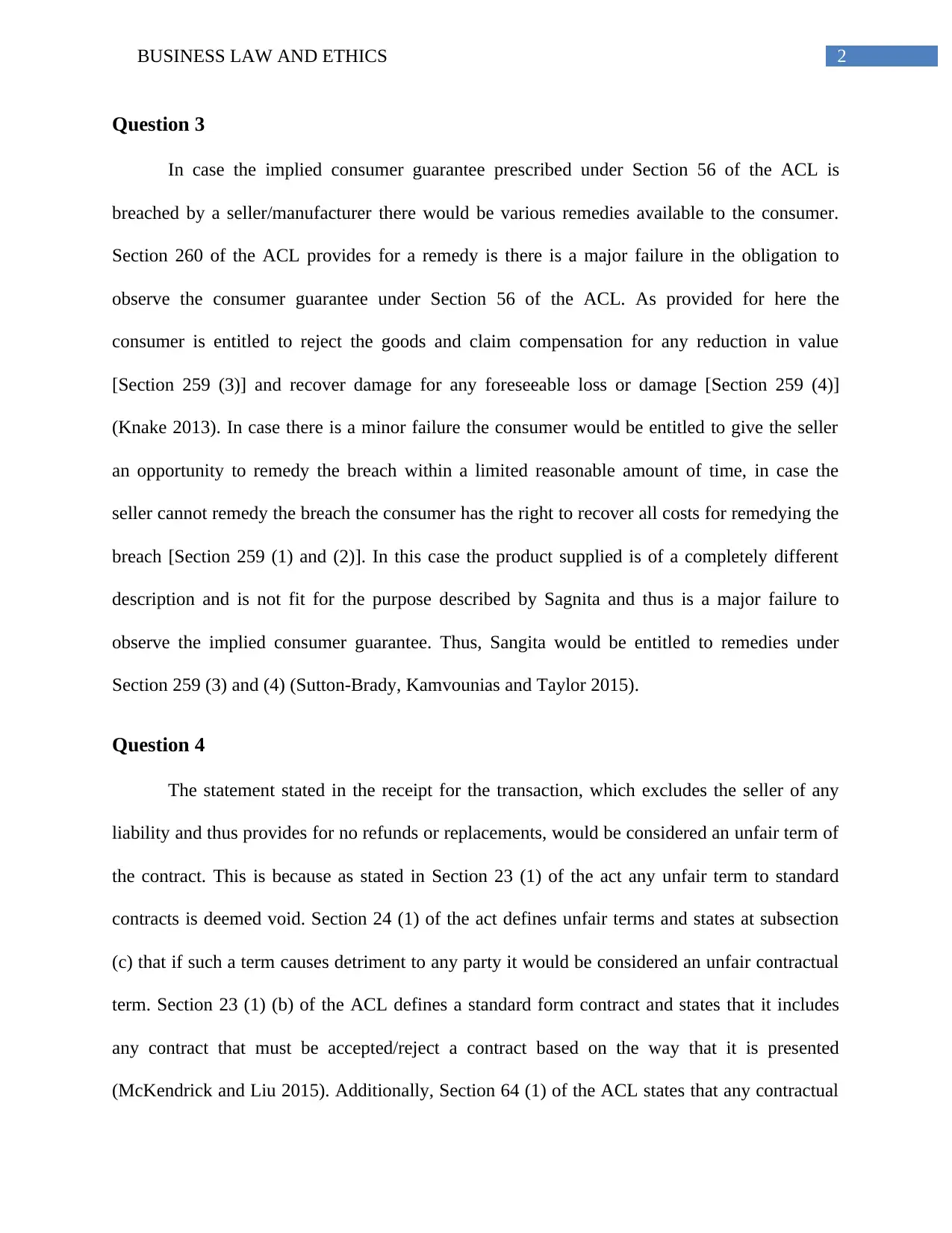
2BUSINESS LAW AND ETHICS
Question 3
In case the implied consumer guarantee prescribed under Section 56 of the ACL is
breached by a seller/manufacturer there would be various remedies available to the consumer.
Section 260 of the ACL provides for a remedy is there is a major failure in the obligation to
observe the consumer guarantee under Section 56 of the ACL. As provided for here the
consumer is entitled to reject the goods and claim compensation for any reduction in value
[Section 259 (3)] and recover damage for any foreseeable loss or damage [Section 259 (4)]
(Knake 2013). In case there is a minor failure the consumer would be entitled to give the seller
an opportunity to remedy the breach within a limited reasonable amount of time, in case the
seller cannot remedy the breach the consumer has the right to recover all costs for remedying the
breach [Section 259 (1) and (2)]. In this case the product supplied is of a completely different
description and is not fit for the purpose described by Sagnita and thus is a major failure to
observe the implied consumer guarantee. Thus, Sangita would be entitled to remedies under
Section 259 (3) and (4) (Sutton-Brady, Kamvounias and Taylor 2015).
Question 4
The statement stated in the receipt for the transaction, which excludes the seller of any
liability and thus provides for no refunds or replacements, would be considered an unfair term of
the contract. This is because as stated in Section 23 (1) of the act any unfair term to standard
contracts is deemed void. Section 24 (1) of the act defines unfair terms and states at subsection
(c) that if such a term causes detriment to any party it would be considered an unfair contractual
term. Section 23 (1) (b) of the ACL defines a standard form contract and states that it includes
any contract that must be accepted/reject a contract based on the way that it is presented
(McKendrick and Liu 2015). Additionally, Section 64 (1) of the ACL states that any contractual
Question 3
In case the implied consumer guarantee prescribed under Section 56 of the ACL is
breached by a seller/manufacturer there would be various remedies available to the consumer.
Section 260 of the ACL provides for a remedy is there is a major failure in the obligation to
observe the consumer guarantee under Section 56 of the ACL. As provided for here the
consumer is entitled to reject the goods and claim compensation for any reduction in value
[Section 259 (3)] and recover damage for any foreseeable loss or damage [Section 259 (4)]
(Knake 2013). In case there is a minor failure the consumer would be entitled to give the seller
an opportunity to remedy the breach within a limited reasonable amount of time, in case the
seller cannot remedy the breach the consumer has the right to recover all costs for remedying the
breach [Section 259 (1) and (2)]. In this case the product supplied is of a completely different
description and is not fit for the purpose described by Sagnita and thus is a major failure to
observe the implied consumer guarantee. Thus, Sangita would be entitled to remedies under
Section 259 (3) and (4) (Sutton-Brady, Kamvounias and Taylor 2015).
Question 4
The statement stated in the receipt for the transaction, which excludes the seller of any
liability and thus provides for no refunds or replacements, would be considered an unfair term of
the contract. This is because as stated in Section 23 (1) of the act any unfair term to standard
contracts is deemed void. Section 24 (1) of the act defines unfair terms and states at subsection
(c) that if such a term causes detriment to any party it would be considered an unfair contractual
term. Section 23 (1) (b) of the ACL defines a standard form contract and states that it includes
any contract that must be accepted/reject a contract based on the way that it is presented
(McKendrick and Liu 2015). Additionally, Section 64 (1) of the ACL states that any contractual
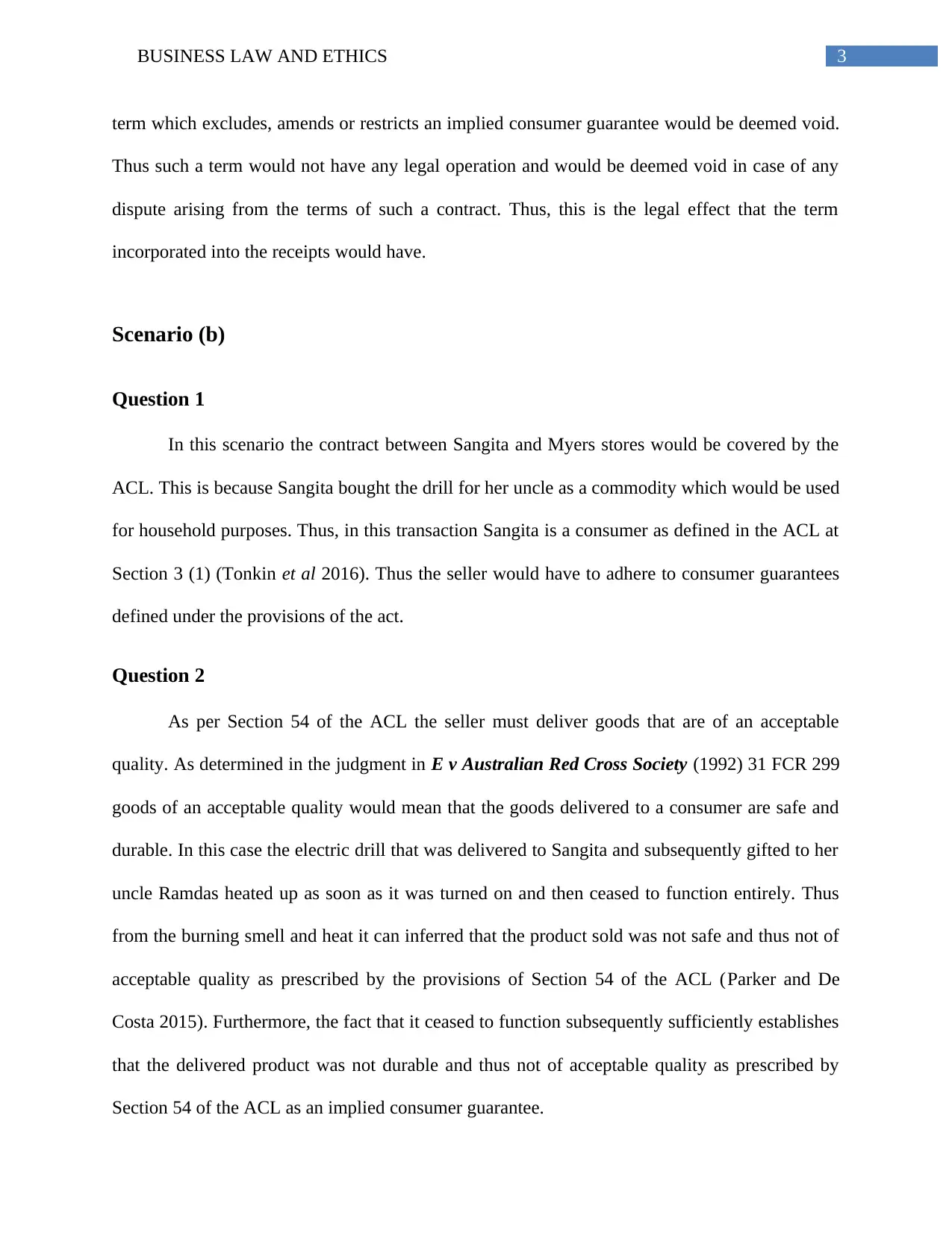
3BUSINESS LAW AND ETHICS
term which excludes, amends or restricts an implied consumer guarantee would be deemed void.
Thus such a term would not have any legal operation and would be deemed void in case of any
dispute arising from the terms of such a contract. Thus, this is the legal effect that the term
incorporated into the receipts would have.
Scenario (b)
Question 1
In this scenario the contract between Sangita and Myers stores would be covered by the
ACL. This is because Sangita bought the drill for her uncle as a commodity which would be used
for household purposes. Thus, in this transaction Sangita is a consumer as defined in the ACL at
Section 3 (1) (Tonkin et al 2016). Thus the seller would have to adhere to consumer guarantees
defined under the provisions of the act.
Question 2
As per Section 54 of the ACL the seller must deliver goods that are of an acceptable
quality. As determined in the judgment in E v Australian Red Cross Society (1992) 31 FCR 299
goods of an acceptable quality would mean that the goods delivered to a consumer are safe and
durable. In this case the electric drill that was delivered to Sangita and subsequently gifted to her
uncle Ramdas heated up as soon as it was turned on and then ceased to function entirely. Thus
from the burning smell and heat it can inferred that the product sold was not safe and thus not of
acceptable quality as prescribed by the provisions of Section 54 of the ACL (Parker and De
Costa 2015). Furthermore, the fact that it ceased to function subsequently sufficiently establishes
that the delivered product was not durable and thus not of acceptable quality as prescribed by
Section 54 of the ACL as an implied consumer guarantee.
term which excludes, amends or restricts an implied consumer guarantee would be deemed void.
Thus such a term would not have any legal operation and would be deemed void in case of any
dispute arising from the terms of such a contract. Thus, this is the legal effect that the term
incorporated into the receipts would have.
Scenario (b)
Question 1
In this scenario the contract between Sangita and Myers stores would be covered by the
ACL. This is because Sangita bought the drill for her uncle as a commodity which would be used
for household purposes. Thus, in this transaction Sangita is a consumer as defined in the ACL at
Section 3 (1) (Tonkin et al 2016). Thus the seller would have to adhere to consumer guarantees
defined under the provisions of the act.
Question 2
As per Section 54 of the ACL the seller must deliver goods that are of an acceptable
quality. As determined in the judgment in E v Australian Red Cross Society (1992) 31 FCR 299
goods of an acceptable quality would mean that the goods delivered to a consumer are safe and
durable. In this case the electric drill that was delivered to Sangita and subsequently gifted to her
uncle Ramdas heated up as soon as it was turned on and then ceased to function entirely. Thus
from the burning smell and heat it can inferred that the product sold was not safe and thus not of
acceptable quality as prescribed by the provisions of Section 54 of the ACL (Parker and De
Costa 2015). Furthermore, the fact that it ceased to function subsequently sufficiently establishes
that the delivered product was not durable and thus not of acceptable quality as prescribed by
Section 54 of the ACL as an implied consumer guarantee.
Secure Best Marks with AI Grader
Need help grading? Try our AI Grader for instant feedback on your assignments.
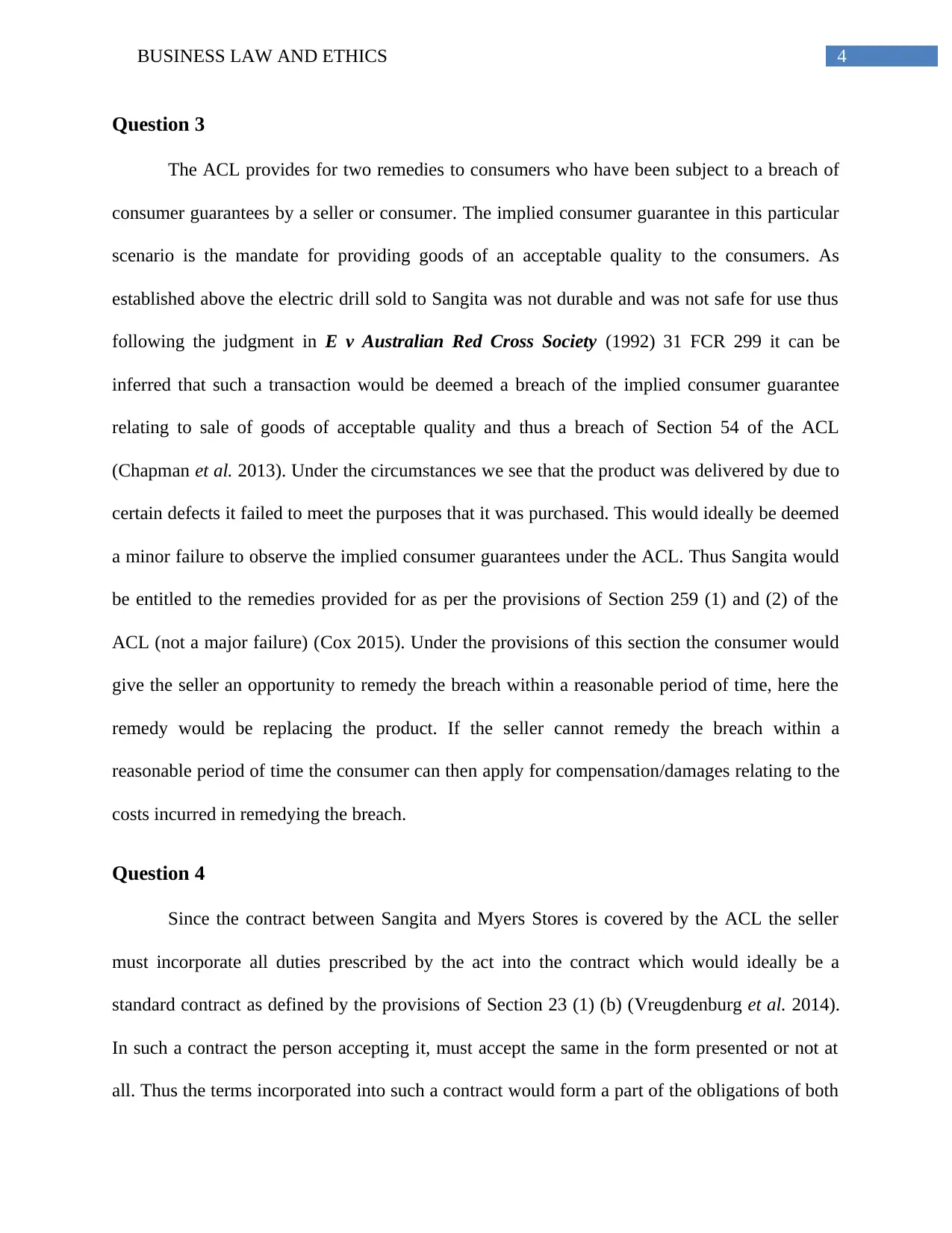
4BUSINESS LAW AND ETHICS
Question 3
The ACL provides for two remedies to consumers who have been subject to a breach of
consumer guarantees by a seller or consumer. The implied consumer guarantee in this particular
scenario is the mandate for providing goods of an acceptable quality to the consumers. As
established above the electric drill sold to Sangita was not durable and was not safe for use thus
following the judgment in E v Australian Red Cross Society (1992) 31 FCR 299 it can be
inferred that such a transaction would be deemed a breach of the implied consumer guarantee
relating to sale of goods of acceptable quality and thus a breach of Section 54 of the ACL
(Chapman et al. 2013). Under the circumstances we see that the product was delivered by due to
certain defects it failed to meet the purposes that it was purchased. This would ideally be deemed
a minor failure to observe the implied consumer guarantees under the ACL. Thus Sangita would
be entitled to the remedies provided for as per the provisions of Section 259 (1) and (2) of the
ACL (not a major failure) (Cox 2015). Under the provisions of this section the consumer would
give the seller an opportunity to remedy the breach within a reasonable period of time, here the
remedy would be replacing the product. If the seller cannot remedy the breach within a
reasonable period of time the consumer can then apply for compensation/damages relating to the
costs incurred in remedying the breach.
Question 4
Since the contract between Sangita and Myers Stores is covered by the ACL the seller
must incorporate all duties prescribed by the act into the contract which would ideally be a
standard contract as defined by the provisions of Section 23 (1) (b) (Vreugdenburg et al. 2014).
In such a contract the person accepting it, must accept the same in the form presented or not at
all. Thus the terms incorporated into such a contract would form a part of the obligations of both
Question 3
The ACL provides for two remedies to consumers who have been subject to a breach of
consumer guarantees by a seller or consumer. The implied consumer guarantee in this particular
scenario is the mandate for providing goods of an acceptable quality to the consumers. As
established above the electric drill sold to Sangita was not durable and was not safe for use thus
following the judgment in E v Australian Red Cross Society (1992) 31 FCR 299 it can be
inferred that such a transaction would be deemed a breach of the implied consumer guarantee
relating to sale of goods of acceptable quality and thus a breach of Section 54 of the ACL
(Chapman et al. 2013). Under the circumstances we see that the product was delivered by due to
certain defects it failed to meet the purposes that it was purchased. This would ideally be deemed
a minor failure to observe the implied consumer guarantees under the ACL. Thus Sangita would
be entitled to the remedies provided for as per the provisions of Section 259 (1) and (2) of the
ACL (not a major failure) (Cox 2015). Under the provisions of this section the consumer would
give the seller an opportunity to remedy the breach within a reasonable period of time, here the
remedy would be replacing the product. If the seller cannot remedy the breach within a
reasonable period of time the consumer can then apply for compensation/damages relating to the
costs incurred in remedying the breach.
Question 4
Since the contract between Sangita and Myers Stores is covered by the ACL the seller
must incorporate all duties prescribed by the act into the contract which would ideally be a
standard contract as defined by the provisions of Section 23 (1) (b) (Vreugdenburg et al. 2014).
In such a contract the person accepting it, must accept the same in the form presented or not at
all. Thus the terms incorporated into such a contract would form a part of the obligations of both
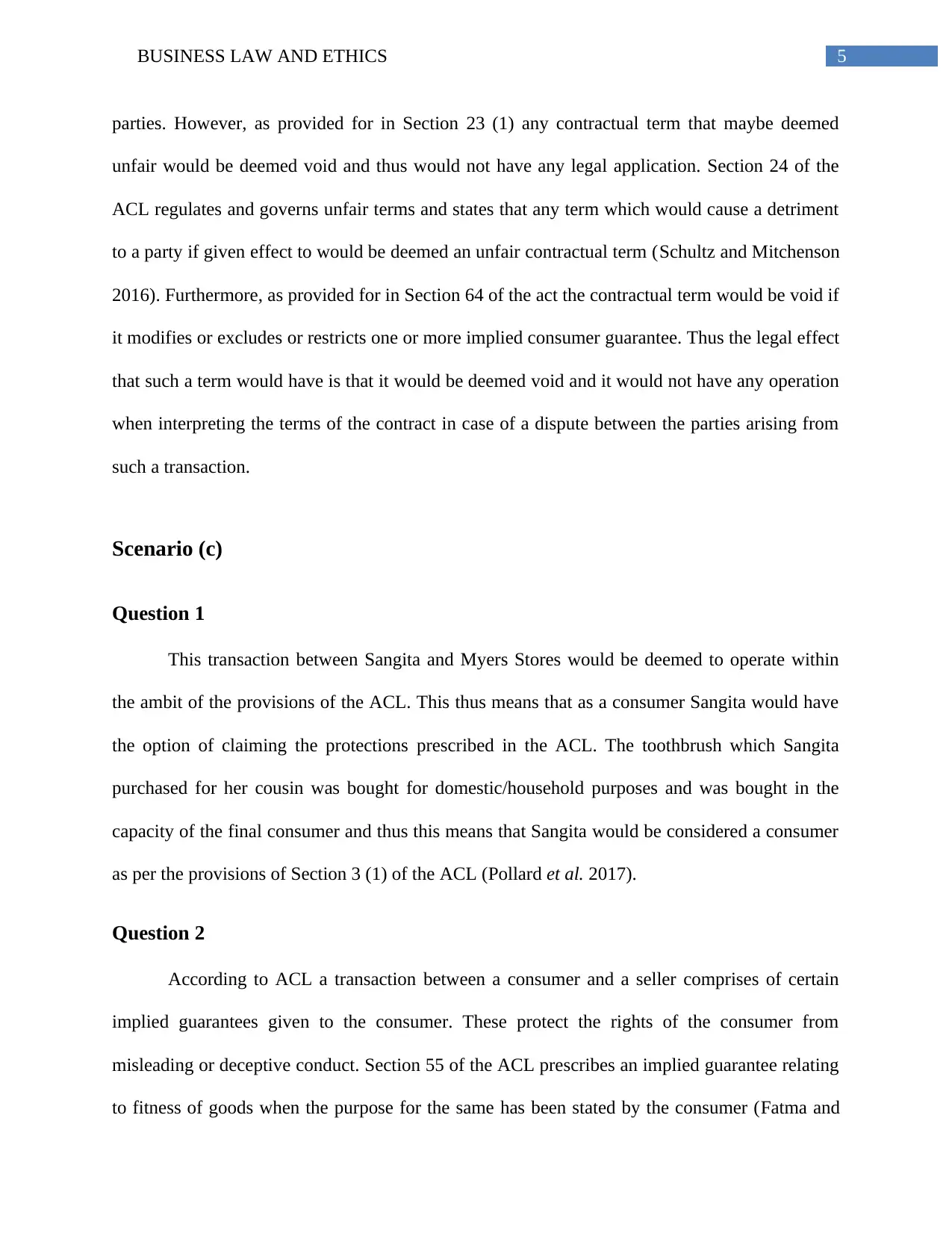
5BUSINESS LAW AND ETHICS
parties. However, as provided for in Section 23 (1) any contractual term that maybe deemed
unfair would be deemed void and thus would not have any legal application. Section 24 of the
ACL regulates and governs unfair terms and states that any term which would cause a detriment
to a party if given effect to would be deemed an unfair contractual term (Schultz and Mitchenson
2016). Furthermore, as provided for in Section 64 of the act the contractual term would be void if
it modifies or excludes or restricts one or more implied consumer guarantee. Thus the legal effect
that such a term would have is that it would be deemed void and it would not have any operation
when interpreting the terms of the contract in case of a dispute between the parties arising from
such a transaction.
Scenario (c)
Question 1
This transaction between Sangita and Myers Stores would be deemed to operate within
the ambit of the provisions of the ACL. This thus means that as a consumer Sangita would have
the option of claiming the protections prescribed in the ACL. The toothbrush which Sangita
purchased for her cousin was bought for domestic/household purposes and was bought in the
capacity of the final consumer and thus this means that Sangita would be considered a consumer
as per the provisions of Section 3 (1) of the ACL (Pollard et al. 2017).
Question 2
According to ACL a transaction between a consumer and a seller comprises of certain
implied guarantees given to the consumer. These protect the rights of the consumer from
misleading or deceptive conduct. Section 55 of the ACL prescribes an implied guarantee relating
to fitness of goods when the purpose for the same has been stated by the consumer (Fatma and
parties. However, as provided for in Section 23 (1) any contractual term that maybe deemed
unfair would be deemed void and thus would not have any legal application. Section 24 of the
ACL regulates and governs unfair terms and states that any term which would cause a detriment
to a party if given effect to would be deemed an unfair contractual term (Schultz and Mitchenson
2016). Furthermore, as provided for in Section 64 of the act the contractual term would be void if
it modifies or excludes or restricts one or more implied consumer guarantee. Thus the legal effect
that such a term would have is that it would be deemed void and it would not have any operation
when interpreting the terms of the contract in case of a dispute between the parties arising from
such a transaction.
Scenario (c)
Question 1
This transaction between Sangita and Myers Stores would be deemed to operate within
the ambit of the provisions of the ACL. This thus means that as a consumer Sangita would have
the option of claiming the protections prescribed in the ACL. The toothbrush which Sangita
purchased for her cousin was bought for domestic/household purposes and was bought in the
capacity of the final consumer and thus this means that Sangita would be considered a consumer
as per the provisions of Section 3 (1) of the ACL (Pollard et al. 2017).
Question 2
According to ACL a transaction between a consumer and a seller comprises of certain
implied guarantees given to the consumer. These protect the rights of the consumer from
misleading or deceptive conduct. Section 55 of the ACL prescribes an implied guarantee relating
to fitness of goods when the purpose for the same has been stated by the consumer (Fatma and
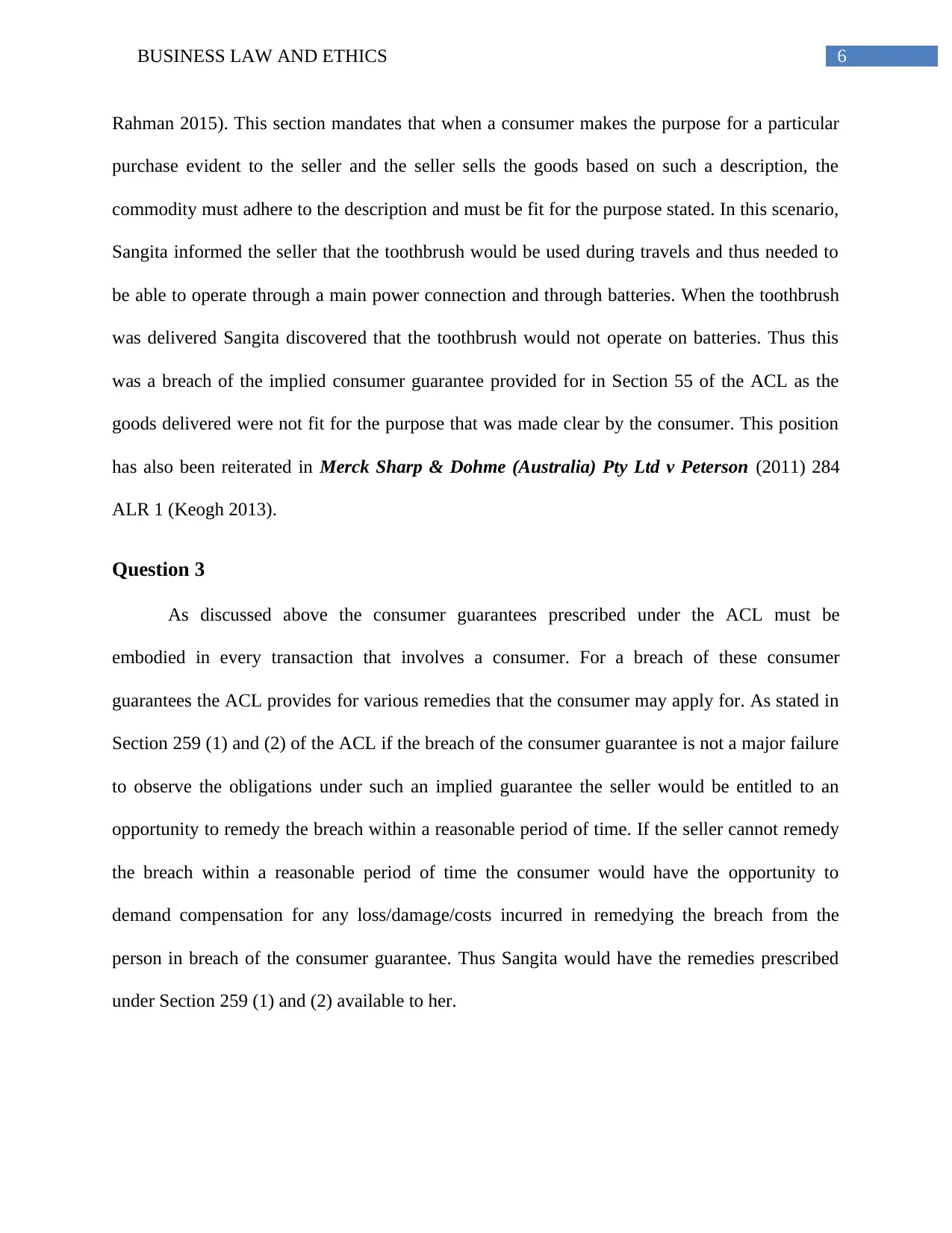
6BUSINESS LAW AND ETHICS
Rahman 2015). This section mandates that when a consumer makes the purpose for a particular
purchase evident to the seller and the seller sells the goods based on such a description, the
commodity must adhere to the description and must be fit for the purpose stated. In this scenario,
Sangita informed the seller that the toothbrush would be used during travels and thus needed to
be able to operate through a main power connection and through batteries. When the toothbrush
was delivered Sangita discovered that the toothbrush would not operate on batteries. Thus this
was a breach of the implied consumer guarantee provided for in Section 55 of the ACL as the
goods delivered were not fit for the purpose that was made clear by the consumer. This position
has also been reiterated in Merck Sharp & Dohme (Australia) Pty Ltd v Peterson (2011) 284
ALR 1 (Keogh 2013).
Question 3
As discussed above the consumer guarantees prescribed under the ACL must be
embodied in every transaction that involves a consumer. For a breach of these consumer
guarantees the ACL provides for various remedies that the consumer may apply for. As stated in
Section 259 (1) and (2) of the ACL if the breach of the consumer guarantee is not a major failure
to observe the obligations under such an implied guarantee the seller would be entitled to an
opportunity to remedy the breach within a reasonable period of time. If the seller cannot remedy
the breach within a reasonable period of time the consumer would have the opportunity to
demand compensation for any loss/damage/costs incurred in remedying the breach from the
person in breach of the consumer guarantee. Thus Sangita would have the remedies prescribed
under Section 259 (1) and (2) available to her.
Rahman 2015). This section mandates that when a consumer makes the purpose for a particular
purchase evident to the seller and the seller sells the goods based on such a description, the
commodity must adhere to the description and must be fit for the purpose stated. In this scenario,
Sangita informed the seller that the toothbrush would be used during travels and thus needed to
be able to operate through a main power connection and through batteries. When the toothbrush
was delivered Sangita discovered that the toothbrush would not operate on batteries. Thus this
was a breach of the implied consumer guarantee provided for in Section 55 of the ACL as the
goods delivered were not fit for the purpose that was made clear by the consumer. This position
has also been reiterated in Merck Sharp & Dohme (Australia) Pty Ltd v Peterson (2011) 284
ALR 1 (Keogh 2013).
Question 3
As discussed above the consumer guarantees prescribed under the ACL must be
embodied in every transaction that involves a consumer. For a breach of these consumer
guarantees the ACL provides for various remedies that the consumer may apply for. As stated in
Section 259 (1) and (2) of the ACL if the breach of the consumer guarantee is not a major failure
to observe the obligations under such an implied guarantee the seller would be entitled to an
opportunity to remedy the breach within a reasonable period of time. If the seller cannot remedy
the breach within a reasonable period of time the consumer would have the opportunity to
demand compensation for any loss/damage/costs incurred in remedying the breach from the
person in breach of the consumer guarantee. Thus Sangita would have the remedies prescribed
under Section 259 (1) and (2) available to her.
Paraphrase This Document
Need a fresh take? Get an instant paraphrase of this document with our AI Paraphraser
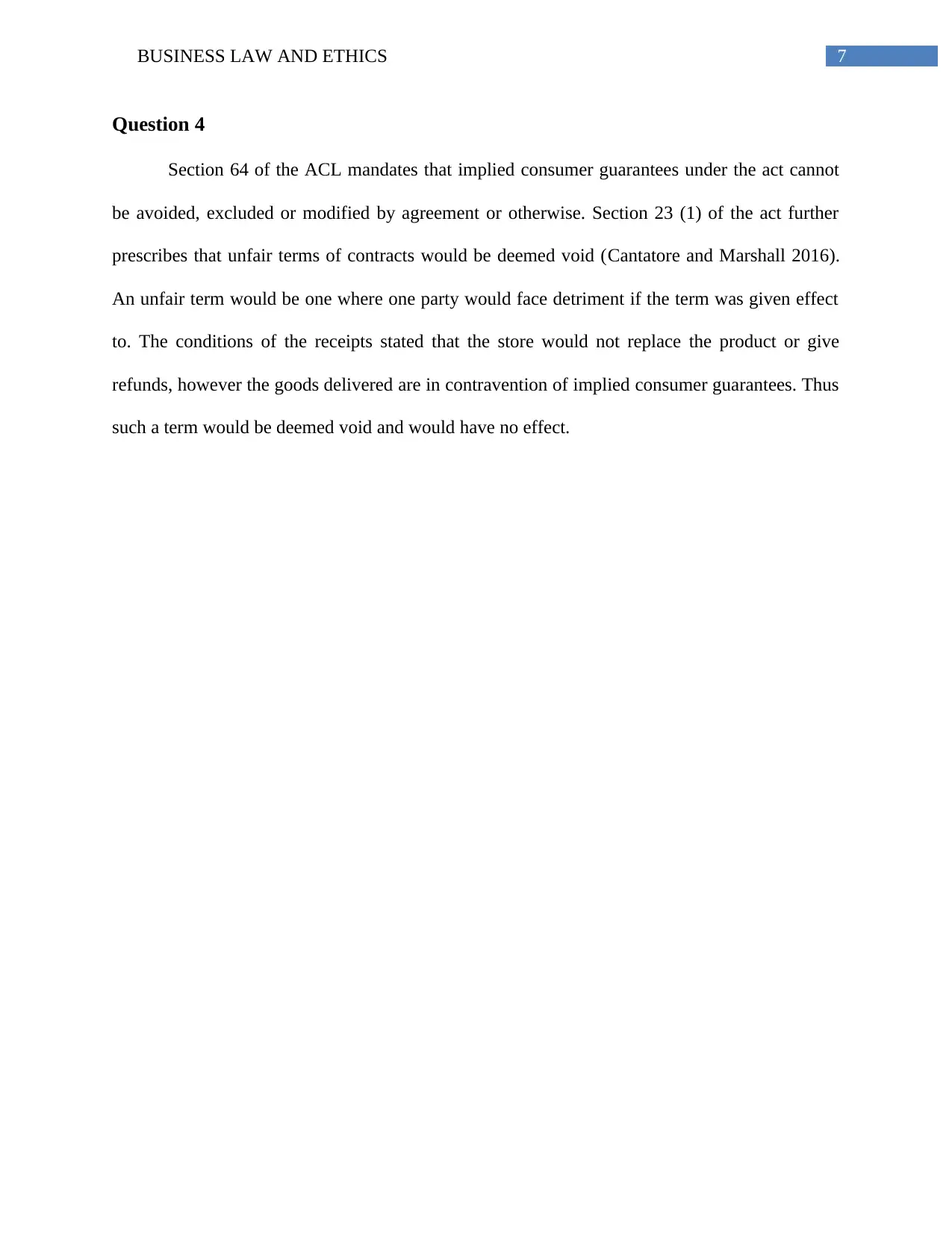
7BUSINESS LAW AND ETHICS
Question 4
Section 64 of the ACL mandates that implied consumer guarantees under the act cannot
be avoided, excluded or modified by agreement or otherwise. Section 23 (1) of the act further
prescribes that unfair terms of contracts would be deemed void (Cantatore and Marshall 2016).
An unfair term would be one where one party would face detriment if the term was given effect
to. The conditions of the receipts stated that the store would not replace the product or give
refunds, however the goods delivered are in contravention of implied consumer guarantees. Thus
such a term would be deemed void and would have no effect.
Question 4
Section 64 of the ACL mandates that implied consumer guarantees under the act cannot
be avoided, excluded or modified by agreement or otherwise. Section 23 (1) of the act further
prescribes that unfair terms of contracts would be deemed void (Cantatore and Marshall 2016).
An unfair term would be one where one party would face detriment if the term was given effect
to. The conditions of the receipts stated that the store would not replace the product or give
refunds, however the goods delivered are in contravention of implied consumer guarantees. Thus
such a term would be deemed void and would have no effect.
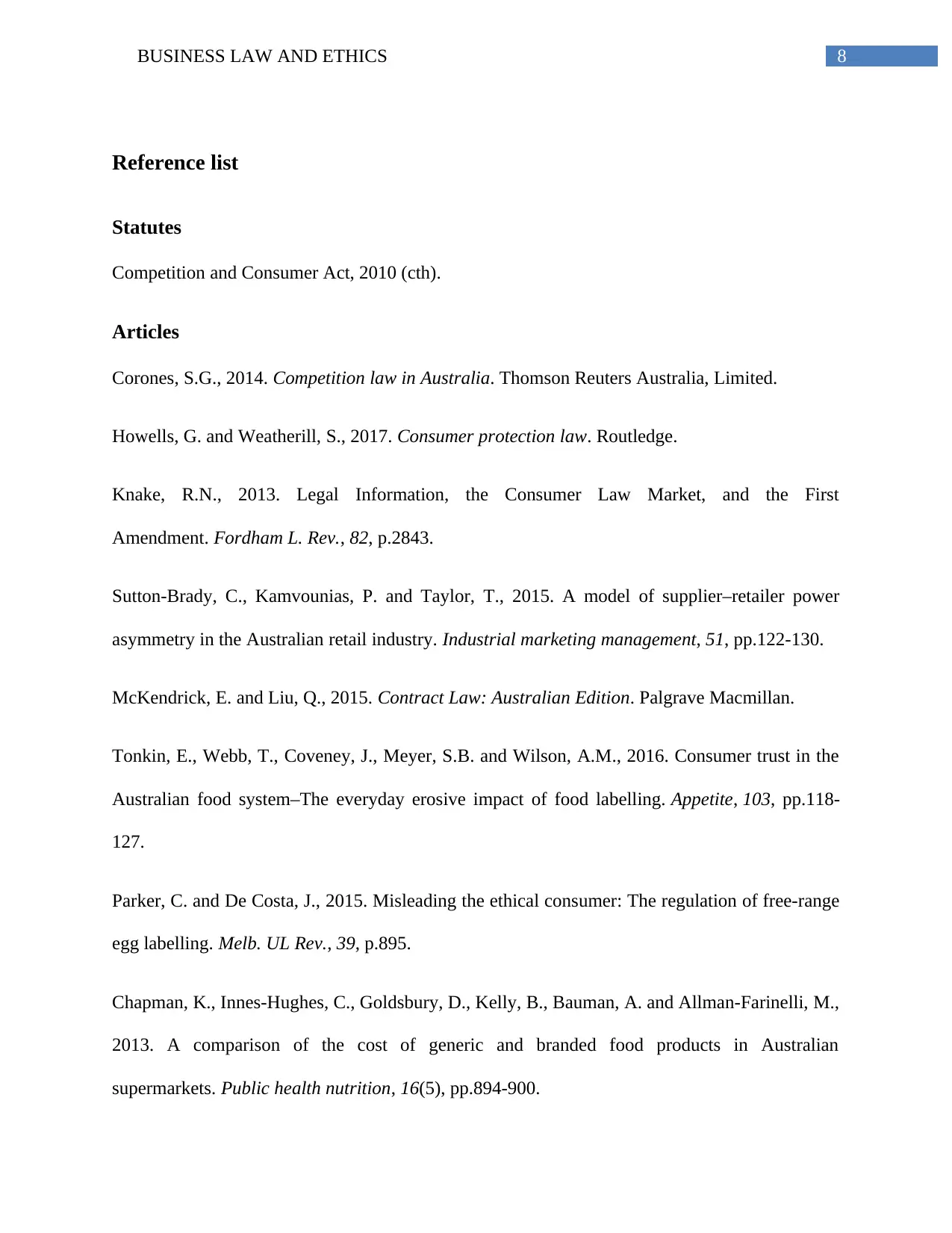
8BUSINESS LAW AND ETHICS
Reference list
Statutes
Competition and Consumer Act, 2010 (cth).
Articles
Corones, S.G., 2014. Competition law in Australia. Thomson Reuters Australia, Limited.
Howells, G. and Weatherill, S., 2017. Consumer protection law. Routledge.
Knake, R.N., 2013. Legal Information, the Consumer Law Market, and the First
Amendment. Fordham L. Rev., 82, p.2843.
Sutton-Brady, C., Kamvounias, P. and Taylor, T., 2015. A model of supplier–retailer power
asymmetry in the Australian retail industry. Industrial marketing management, 51, pp.122-130.
McKendrick, E. and Liu, Q., 2015. Contract Law: Australian Edition. Palgrave Macmillan.
Tonkin, E., Webb, T., Coveney, J., Meyer, S.B. and Wilson, A.M., 2016. Consumer trust in the
Australian food system–The everyday erosive impact of food labelling. Appetite, 103, pp.118-
127.
Parker, C. and De Costa, J., 2015. Misleading the ethical consumer: The regulation of free-range
egg labelling. Melb. UL Rev., 39, p.895.
Chapman, K., Innes-Hughes, C., Goldsbury, D., Kelly, B., Bauman, A. and Allman-Farinelli, M.,
2013. A comparison of the cost of generic and branded food products in Australian
supermarkets. Public health nutrition, 16(5), pp.894-900.
Reference list
Statutes
Competition and Consumer Act, 2010 (cth).
Articles
Corones, S.G., 2014. Competition law in Australia. Thomson Reuters Australia, Limited.
Howells, G. and Weatherill, S., 2017. Consumer protection law. Routledge.
Knake, R.N., 2013. Legal Information, the Consumer Law Market, and the First
Amendment. Fordham L. Rev., 82, p.2843.
Sutton-Brady, C., Kamvounias, P. and Taylor, T., 2015. A model of supplier–retailer power
asymmetry in the Australian retail industry. Industrial marketing management, 51, pp.122-130.
McKendrick, E. and Liu, Q., 2015. Contract Law: Australian Edition. Palgrave Macmillan.
Tonkin, E., Webb, T., Coveney, J., Meyer, S.B. and Wilson, A.M., 2016. Consumer trust in the
Australian food system–The everyday erosive impact of food labelling. Appetite, 103, pp.118-
127.
Parker, C. and De Costa, J., 2015. Misleading the ethical consumer: The regulation of free-range
egg labelling. Melb. UL Rev., 39, p.895.
Chapman, K., Innes-Hughes, C., Goldsbury, D., Kelly, B., Bauman, A. and Allman-Farinelli, M.,
2013. A comparison of the cost of generic and branded food products in Australian
supermarkets. Public health nutrition, 16(5), pp.894-900.
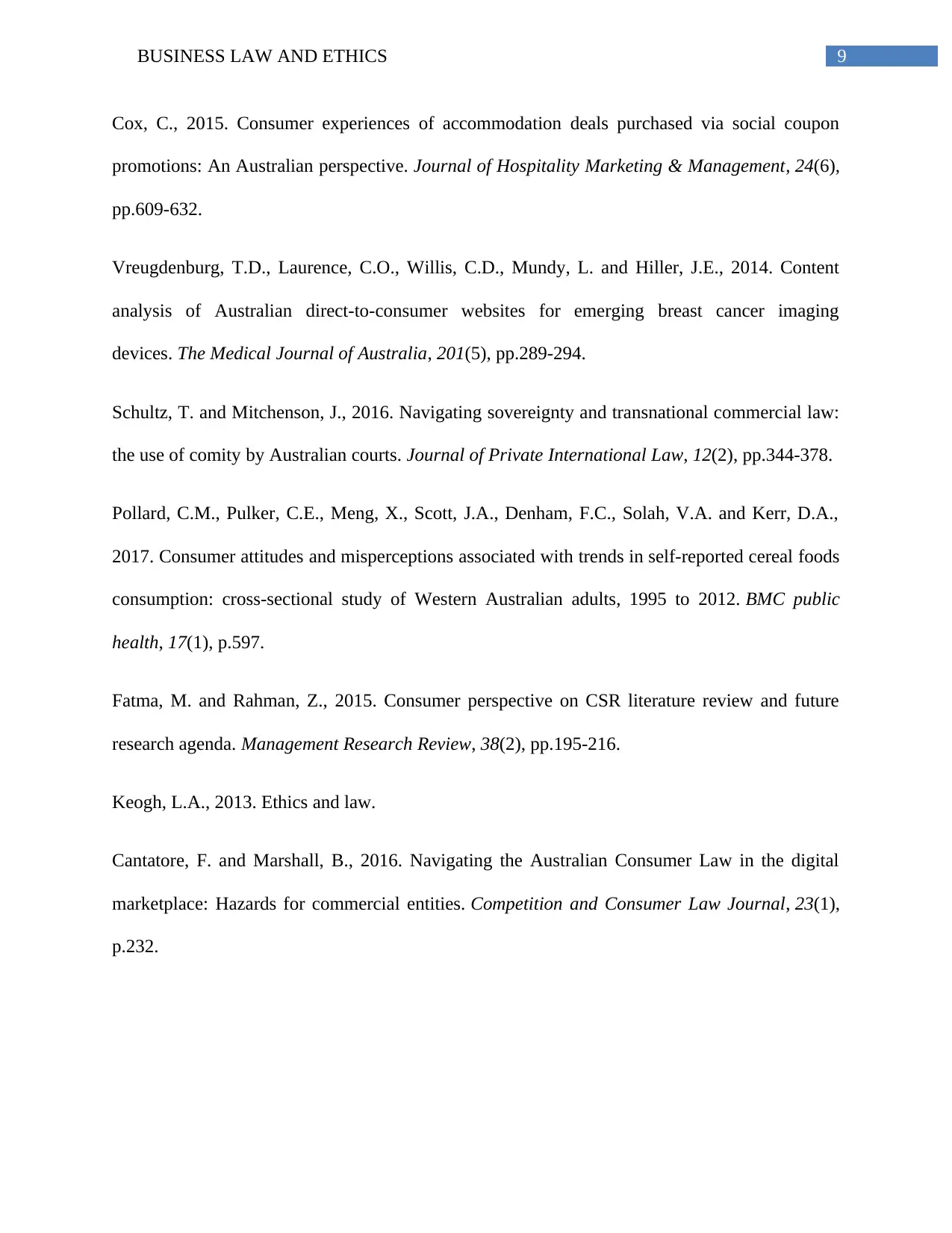
9BUSINESS LAW AND ETHICS
Cox, C., 2015. Consumer experiences of accommodation deals purchased via social coupon
promotions: An Australian perspective. Journal of Hospitality Marketing & Management, 24(6),
pp.609-632.
Vreugdenburg, T.D., Laurence, C.O., Willis, C.D., Mundy, L. and Hiller, J.E., 2014. Content
analysis of Australian direct-to-consumer websites for emerging breast cancer imaging
devices. The Medical Journal of Australia, 201(5), pp.289-294.
Schultz, T. and Mitchenson, J., 2016. Navigating sovereignty and transnational commercial law:
the use of comity by Australian courts. Journal of Private International Law, 12(2), pp.344-378.
Pollard, C.M., Pulker, C.E., Meng, X., Scott, J.A., Denham, F.C., Solah, V.A. and Kerr, D.A.,
2017. Consumer attitudes and misperceptions associated with trends in self-reported cereal foods
consumption: cross-sectional study of Western Australian adults, 1995 to 2012. BMC public
health, 17(1), p.597.
Fatma, M. and Rahman, Z., 2015. Consumer perspective on CSR literature review and future
research agenda. Management Research Review, 38(2), pp.195-216.
Keogh, L.A., 2013. Ethics and law.
Cantatore, F. and Marshall, B., 2016. Navigating the Australian Consumer Law in the digital
marketplace: Hazards for commercial entities. Competition and Consumer Law Journal, 23(1),
p.232.
Cox, C., 2015. Consumer experiences of accommodation deals purchased via social coupon
promotions: An Australian perspective. Journal of Hospitality Marketing & Management, 24(6),
pp.609-632.
Vreugdenburg, T.D., Laurence, C.O., Willis, C.D., Mundy, L. and Hiller, J.E., 2014. Content
analysis of Australian direct-to-consumer websites for emerging breast cancer imaging
devices. The Medical Journal of Australia, 201(5), pp.289-294.
Schultz, T. and Mitchenson, J., 2016. Navigating sovereignty and transnational commercial law:
the use of comity by Australian courts. Journal of Private International Law, 12(2), pp.344-378.
Pollard, C.M., Pulker, C.E., Meng, X., Scott, J.A., Denham, F.C., Solah, V.A. and Kerr, D.A.,
2017. Consumer attitudes and misperceptions associated with trends in self-reported cereal foods
consumption: cross-sectional study of Western Australian adults, 1995 to 2012. BMC public
health, 17(1), p.597.
Fatma, M. and Rahman, Z., 2015. Consumer perspective on CSR literature review and future
research agenda. Management Research Review, 38(2), pp.195-216.
Keogh, L.A., 2013. Ethics and law.
Cantatore, F. and Marshall, B., 2016. Navigating the Australian Consumer Law in the digital
marketplace: Hazards for commercial entities. Competition and Consumer Law Journal, 23(1),
p.232.
1 out of 10
Related Documents
Your All-in-One AI-Powered Toolkit for Academic Success.
+13062052269
info@desklib.com
Available 24*7 on WhatsApp / Email
![[object Object]](/_next/static/media/star-bottom.7253800d.svg)
Unlock your academic potential
© 2024 | Zucol Services PVT LTD | All rights reserved.





